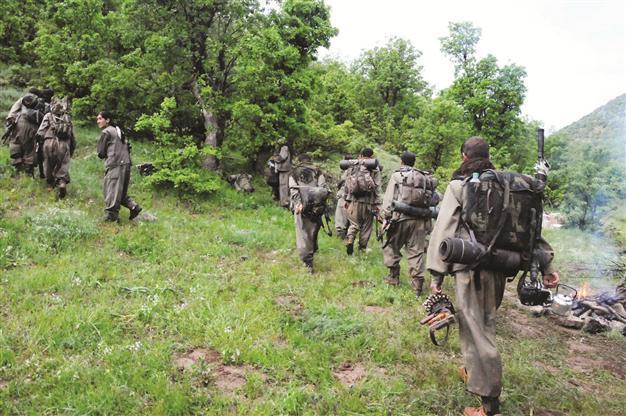Main opposition proposes its road map for Kurdish issue
Emine Kart ANKARA - Hürriyet Daily News

This photo shows PKK militants withdrawing from Turkish soil as part of the ongoing peace process. Main opposition Republican People’s Party (CHP) Deputy Chair Sezgin Tanrıkulu (inset) says the government should take 'concrete steps.' DHA photo
Concrete steps should be taken by the government through legislative and judicial arrangements in order to prevent failure in the stalled peace process, a senior executive of the main opposition Republican People’s Party (CHP) has said.“At the moment, there is only one situation that is clear. It is a fact that there is no armed conflict; but other than that, the organization is preserving its position. That’s to say, the organization is prepared for any probable conflict, while there is no signal indicating that it will take the path to the political arena from the armed struggle,” CHP Deputy Chair Sezgin Tanrıkulu told the Hürriyet Daily News yesterday. He was referring to the outlawed Kurdistan Worker’s Party’s (PKK) position within the government-led peace process aimed at ending the three-decade long conflict between the PKK and the security forces of Turkey.
As of July 16, Tanrıkulu was in his hometown Diyarbakır, where he presented a 220-page book, “Securing Societal Peace through Democracy,” compiling the legislative work conducted by the CHP since the June 12, 2011 elections.
Lowering the election threshold, removing language bans in politics, rearranging treasury help for political parties, village guards’ employment in other fields, the use of changed names together with new ones (for villages, etc.), changing names that remind of trauma, turning the infamous Diyarbakır Prison into a museum, declaring Nevruz an official holiday, recognizing the Halabja/Enfal massacre, opening the Dersim archives, re-regulating the law on returning to villages, removing specially authorized courts, abolishing lapse of time in cases of the perpetrators of unsolved murders, launching inquiries into the Uludere/Roboski massacre, the problems caused by forced migration, the perpetrators of unsolved murders and losses and the use of torture, and empowering local administrations are among the proposals introduced by the CHP in the last two years.
‘Problem of democracy’
“The government is still not able to realize that there is a problem of democracy, and failing to take the required steps. There are steps to be taken,” he said, while warning the government not to take a position dictated by the PKK.
The peace process is involving jailed PKK leader Abdullah Öcalan as a key actor. While the National Intelligence Organization (MİT) is playing a central role, the Peace and Democracy Party (BDP) deputies and pro-Kurdish politicians have also been involved in the process assumed to have begun as of 2012 autumn. Yet, the process has wavered. For Ankara, the slowness in the PKK’s withdrawal into northern Iraq seems to be an excuse for not launching a set of democratization reforms, Tanrıkulu said.
“The worst scenario is the foiling of this process. There is a big hope among people but this hope is gradually turning into a lack of confidence. It is the government who will break through this situation through legislative moves and it is the judiciary as well by making gestures. There are lots of people jailed and the judiciary is not relieving the situation, but is making it more troubled by not allowing any motivation to rise as it insists on not implementing requirements of a recent Constitutional Court ruling which declared that the lengthy pre-trial detentions are unconstitutional,” he said.
He was referring to the fact that there are hundreds of suspected members of the outlawed Kurdistan Communities Union (KCK), the alleged urban wing of the PKK, in detention.
Nonetheless, Tanrıkulu also mentioned the "drawbacks" of taking the PKK as a counterpart instead of the BDP, a legitimate political actor.
“The government has not been able to consider the BDP a political actor and strengthen its hand. Instead, it constantly weakened this actor by underestimation and humiliation,” he said.
















